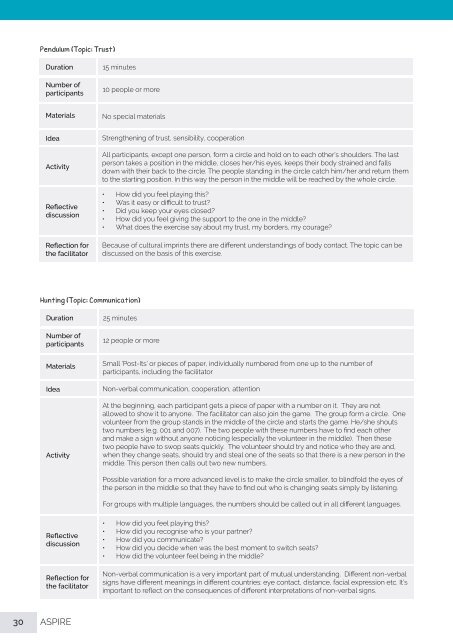181208_Training-Module_interactive
You also want an ePaper? Increase the reach of your titles
YUMPU automatically turns print PDFs into web optimized ePapers that Google loves.
Pendulum (Topic: Trust)<br />
Duration<br />
Number of<br />
participants<br />
15 minutes<br />
10 people or more<br />
Materials<br />
No special materials<br />
Idea<br />
Activity<br />
Reflective<br />
discussion<br />
Reflection for<br />
the facilitator<br />
Strengthening of trust, sensibility, cooperation<br />
All participants, except one person, form a circle and hold on to each other’s shoulders. The last<br />
person takes a position in the middle, closes her/his eyes, keeps their body strained and falls<br />
down with their back to the circle. The people standing in the circle catch him/her and return them<br />
to the starting position. In this way the person in the middle will be reached by the whole circle.<br />
• How did you feel playing this?<br />
• Was it easy or difficult to trust?<br />
• Did you keep your eyes closed?<br />
• How did you feel giving the support to the one in the middle?<br />
• What does the exercise say about my trust, my borders, my courage?<br />
Because of cultural imprints there are different understandings of body contact. The topic can be<br />
discussed on the basis of this exercise.<br />
Hunting (Topic: Communication)<br />
Duration<br />
Number of<br />
participants<br />
25 minutes<br />
12 people or more<br />
Materials<br />
Idea<br />
Activity<br />
Small ‘Post-Its’ or pieces of paper, individually numbered from one up to the number of<br />
participants, including the facilitator<br />
Non-verbal communication, cooperation, attention<br />
At the beginning, each participant gets a piece of paper with a number on it. They are not<br />
allowed to show it to anyone. The facilitator can also join the game. The group form a circle. One<br />
volunteer from the group stands in the middle of the circle and starts the game. He/she shouts<br />
two numbers (e.g. 001 and 007). The two people with these numbers have to find each other<br />
and make a sign without anyone noticing (especially the volunteer in the middle). Then these<br />
two people have to swop seats quickly. The volunteer should try and notice who they are and,<br />
when they change seats, should try and steal one of the seats so that there is a new person in the<br />
middle. This person then calls out two new numbers.<br />
Possible variation for a more advanced level is to make the circle smaller, to blindfold the eyes of<br />
the person in the middle so that they have to find out who is changing seats simply by listening.<br />
For groups with multiple languages, the numbers should be called out in all different languages.<br />
Reflective<br />
discussion<br />
Reflection for<br />
the facilitator<br />
• How did you feel playing this?<br />
• How did you recognise who is your partner?<br />
• How did you communicate?<br />
• How did you decide when was the best moment to switch seats?<br />
• How did the volunteer feel being in the middle?<br />
Non-verbal communication is a very important part of mutual understanding. Different non-verbal<br />
signs have different meanings in different countries: eye contact, distance, facial expression etc. It’s<br />
important to reflect on the consequences of different interpretations of non-verbal signs.<br />
30 ASPIRE




